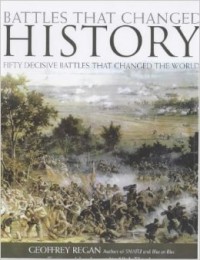
Written by: Geoffrey Regan
Submitted By: Robert Douglas
This book is a collection of fifty battles which forever changed the course of history. There are many famous, familiar ones: Gaugamela, Hastings, Bosworth, Blenheim, Waterloo... yet there's also other, more obscure engagements nevertheless just as intriguing or consequential. Mind-boggling 'what ifs' are briefly explored in the very last or penultimate paragraph of each section - explaining why such battles were regarded as decisive for either side (whether the generals realized it or not).
One of my personal favourites has to be the Battle of Rocroi which took place during the French-Spanish War of the mid-1600's. Before reading about this, I knew very little the reasons of Spain's steady decline from greatness (the Thirty Years War had drained her treasury and her military strength had waned). The narrative is full of fantastic, superb one-liners: '....he [the Duke of Conde] took the army by the scruff of the neck and shook it into shape...' something desperately needed to turn a string of defeats into victory - which was achieved at Rocroi - thus signifying a rise in French fortunes and Spain's inevitable path towards ignominy. This book illustrates such dramatic intrigue throughout.
However, many historians tend to disagree just how 'decisive' such battles really were; in some cases, a defeated side might have recovered, whereas their opposition's future truly depended on a victory. Or, in the long-run, one way or another it didn't really matter. It's for this reason editor Geoffrey Regan has omitted certain battles such as Agincourt (or 'Azincourt') - an unbelievably impossible victory, but one that turned out to be tragically moot: warrior King Henry V died before he could consolidate his power over both crowns, meanwhile the French recovered and, with inspirational guidance of Jean de Arc (a heroine of their own), started recapturing parts of their country. An English defeat at Azincourt, as GR explains in the introduction, would have merely sped up this process, giving the French an extra victory, but nothing more.
But what's included in this book makes good reading and hopefully influence beginner-historians to study such a rich variety of periods further.

